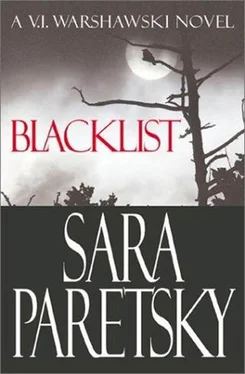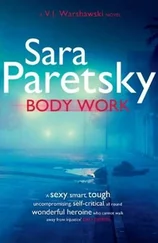I shouldn’t discount Augustus Llewellyn. He could have given Marc doped whisky more easily than a stranger. And he, too, had secrets he was determined to hide.
I tried to imagine a confrontation that would make Renee or Llewellyn show their hand. Nothing came to me. Let the police figure it out. Bobby Mallory had been telling me for years that murder was police work. I’d give him all my tangled ideas, the nurse with seizures, every little thing I’d learned from Geraldine Graham and from the archives. He could turn the police machinery on and if it led to Renee then that’s where it would go.
I pushed myself to my feet, my joints stiff from sitting so long in the cold. The weight in my bag reminded me of my own brief jubilation. Marc’s bottle of bourbon-I’d turn that over to Bobby, too. In exchange, I’d ask Bobby to protect Benji, tell him that Benji was his material witness to whoever put Marc in that Larchmont pond. Bobby was at odds with the federal attorney, he’d work out something.
I thrust away a nagging voice that said Bobby would brush off my ideas as insubstantial, or unsubstantiable. Or that he’d be so angry with me for hiding Benji he wouldn’t listen to me. I didn’t have evidence, the nagger said, only the connections that came from reading archives and listening to people; I didn’t have hard evidence. I fought the notion that Bobby would flat out refuse to investigate that New Solway crowd.
Anyway, I shouldn’t go to Bobby without talking it over with Benji and Father Lou. I’d explain to Benji that things had changed since yesterday
morning: now I knew the murderer was one of two, maybe three, people, all I needed from him was a shortcut to the person’s identity. Bobby and Benji would both do my bidding. They had to.
I went slowly down the stairs to the front walk and climbed into Marc’s Saturn. To my astonishment, it was only four o’clock: I felt as though the day had been going on for thirty or forty hours by now.
The girls were still jumping double Dutch in the road. Among them was the one who’d pointed out Marc’s car to me last week. She nudged someone waiting a turn at the ropes. They all stopped jumping to stare at me. I waved as I climbed into the driver’s seat.
“You with the police, miss? The police want that car or are you stealing it?” my informant asked, hands on hips.
“Stealing,” I said, rolling down the window so they could hear me. That made them laugh and draw closer. “What the police want with Mr. Whitby’s car, miss?”
“Clues. He was killed, you know. We’re hoping the car will hold some clues about who killed him. None of you saw the person who drove this car back here last Sunday night, did you?”
That was too strong. They pulled away, huddling together, quiet. A killer coming right onto the block, no, they didn’t need that fear over their young heads.
I said cheerfully, “Don’t worry if you see lights on in the house tonight. We’re bringing in a caretaker, someone to live here until the family decides to sell. Okay? And don’t worry about this killer-they’re not going to come back here.”
“How do you know?” one of them demanded. “No one been arrested, no one been suspected.”
“Three people are suspected. They live far away. You’re safe here in your neighborhood.”
When I drove up the street, I could see them in my rearview mirror, jump ropes dangling from their hands. While I waited at the light on Thirtyfifth, they finally started turning the ropes again, but the energy had gone out of their play. Good work, VI., sucking the enthusiasm out of little girls.
I took a look at the traffic stalled on the Dan Ryan Expressway and stayed on the side streets, driving slowly but quietly up to St. Remigio’s.
Marc’s green Saturn was just the car for these streets, not flashy, not the kind that people stare at and remember. I parked two blocks west of the church and made a great circle around it on foot so that I came up to the school entrance from the south.
I walked briskly through the gates to the playground, not looking around, although the back of my head prickled as I wondered if any lawmen had me in their sights. Inside, a hall guard still sat on duty. Although it was four-thirty now, afterschool activities were going full spate. No one could come into the school without an ID or a legitimate reason to be there.
The guard made a phone call: Father Lou was in the gym; I could talk to him there. The priest was standing in front of one of his punching bags, dressed in sweats, showing a group of ten-year-olds how to move their arms. Curious glances from the boys made him turn to look at me. Barking a few hasty instructions to them, he came over to my side.
“I got a clean car,” I said. “And I think I have a safe house, where Benji can stay for a couple of days. But-I want to turn the murder investigation over to the police. It’s too big for me. I really need Benji to cooperate. I think I can get Captain Mallory to protect Benji if he’ll only say what he saw last Sunday night. Can you help me persuade him?”
He nodded. “Should be in here now, but maybe this is one of his prayer times. I’ll find him. Wait here.”
He trotted out of the room, light on his feet as a dancer. After a couple of minutes, I put my briefcase down in a corner and picked up a basketball. My first shot caromed off the backboard at a crazy angle, but after that I sank five in a row before the priest returned, jerking his head at me to follow him back to the hall.
“He’s gone. Girl came for him thirty, forty minutes ago. Had to be the girl-one arm bound up inside her clothes. She asked the guard for Benji bold as brass-said he was her cousin from Morocco. Guard sent her to the principal, principal called Benji in, says kid was thrilled to see the girl, walked off with her. Idiots all, principal, guard, the lot. None of them sent for me.”
His Popeye cheeks swelled larger with anger, but I felt only cold. If Catherine had taken Benji back to her grandmother-as I’d counseled this morning-if Renee had put Marc Whitby in the Larchmont Pond, he was as good as dead.
Dully, I followed Father Lou to the principal’s office. I went through the motions with the guard and the principal: Had either of them seen how the kids left? Taxi? Bus? They didn’t know-the school was an old building, put up when windows were built high off the ground to keep you from looking at the street.
Father Lou ordered the principal to summon any teachers or staff still in the building to her office. One of the janitors, moving cartons in from a supply truck, had seen a girl with one arm bound up inside her jacket leave with an older student. He was pretty sure they’d gotten into a white SUV, but he hadn’t been paying close attention.
The old priest was furious. After having the FBI in yesterday looking for Benji, he couldn’t believe the principal would let the youth leave without even trying to discuss the matter with Father Lou.
“We’re trying to make a safe place here. If anyone can come in this school, ask for any kid without you blinking an eye, what’s to stop gangbangers, kidnappers, the whole lot from destroying our peace?”
The principal turned red, angry in her turn: Was she supposed to know that a girl Benji was thrilled to see constituted a menace? If Father Lou wanted to run the school, he should take over-she’d be glad to resign on the spot.
The principal’s red face broke into wavy lines, her mouth moving up and down, as if she was a puppet. The cabinets behind her began moving, too, in the same unsteady waves. It seemed so funny that I started to laugh. The floor began moving, which seemed funny, too, and I was still laughing when I fell over.
My head was wet. Father Lou was wiping water from my neck and face with a rough gym towel.
Читать дальше












